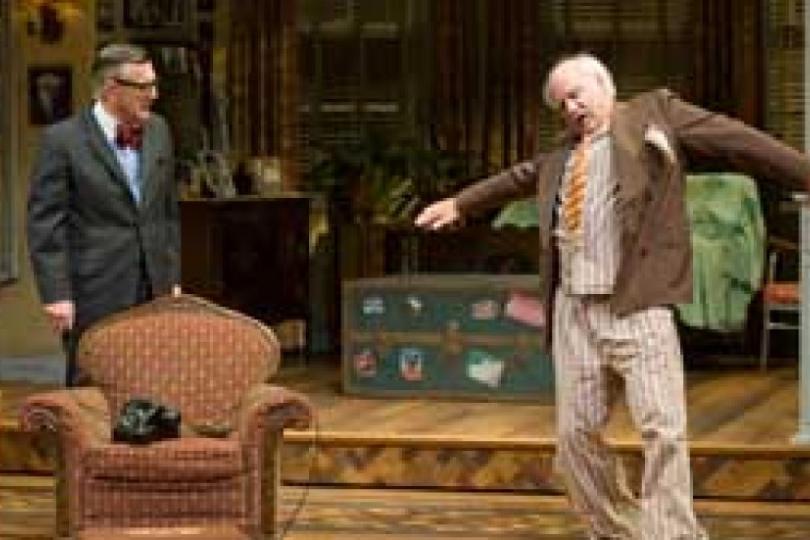If it moves me, astonishes me, engages my interest, makes me laugh, I leave the theater happy. I want the way I see the world to change with every performance I see. Sometimes, rarely, it does.
Perhaps because I’m a director I especially love the work of great ensemble theaters with dedicated, far-seeing directors such as the Théatre de Soleil (Ariane Mnouchkine) and Peter Brook’s work at the Bouffe du Nord in France and the Théatre de Complicité (Simon McBurney) and Cheek by Jowl (Declan Donnellan and Nick Ormerod) in London. These theaters, and others like them, continue to present productions by great innovative directors working with longtime, stable companies. What allows these theaters to create visionary productions of difficult, challenging scripts is the extraordinary level of collaboration between directors, designers, musicians, actors, dancers—everyone involved—which can only happen over time. Perhaps even more important is the quality of the audience who eagerly attend these theaters’ productions
The Théatre de la Jeune Lune operated in this way, and I was a diehard fan for thirty years of much of their work but especially of their wonderful productions of Moliere’s Tartuffe and The Miser.
Terrific performances such as Mark Rylance’s in Jez Butterworth’s Jerusalem; great plays such as Tony Kushner’s Angels in America and Tom Stoppard’s Arcadia have been memorable theater-going experiences for me.
Life-changing performances in 2011-2012
This year, here, I have particularly liked four productions: Buzzer by Tracey Scott Wilson directed by Marion McClinton at Pillsbury House Theatre; As You Like It directed by Lear de Bessonet for Ten Thousand Things; Neil Simon’s The Sunshine Boys directed by Gary Gisselman at the Guthrie Theater; and Sossy Mechanics Trick Boxing in the Dowling Studio. I’m writing about the first three of these productions long after I saw them; some of the details are fuzzy. I found all of them exciting, however, because they are based on intriguing, often excellent scripts, are ensemble-driven, and rely on the actors’ skills for their effectiveness.
Buzzer is an ambitious three-hander that takes on the big subjects: race, class, gender, love, friendship, how to be happy. Fortunately, Wilson has the gift of embedding all this in the action and in fully realized characters with flaws and credible pasts, living complicated believable lives. I saw Buzzer much earlier in the year, but I particularly remember the careful articulation of the charged friendship between the successful African-American Jackson (Namir Smallwood) and white, messed-up Don (Hugh Kennedy) who was taking a time-out from his more or less permanent addiction problem. Playwright and director focused on the shifting alliances between the three characters allowing the larger themes to emerge from their interaction. I thought the actors worked beautifully with each other and brought the physical as well as emotive lives of each of their characters into being. I loved this play and will certainly see the revised version when it is performed again in February 2013.
Ten Thousand Thing’s As You Like It was a cut-down rollicking version of the play, designed mostly for audiences with little access to theater. As with most of their production, As You Like It was largely cast against type and actors played multiple roles. Half the joy of this production was witnessing the actors’ rapid, often very funny transformations from role to role. Bradley Greenwald was particularly fun to watch migrate between the old duke (Rosalind’s father) and Touchstone’s lusty lady love, Audrey. Since Ten Thousand Things’ performs without stage lighting, and with minimal sets and costumes, their productions rely on the actors’ ability to tell the story, their skill at working seamlessly together, and their vocal and physical virtuosity.
Neil Simon’s The Sunshine Boys was a lot of fun to see, largely because of the two central performances by Peter Michael Goetz and Raye Birk. Both Goetz and Birk dug into the characters underlying Simon’s quick, funny text. Both excellent actors, they humanized the roles and made us see the angst each of them concealed; Laurel and Hardy with feelings. Goetz and Birk have worked together frequently which enhances their ability to read each other and react accordingly.
Trick Boxing, written, directed, choreographed and performed by Brian Sostek and Megan McClellan, shines because of its sweet, nutty script with Sostek shifting back and forth between at least fourteen characters, and several terrific ballroom dance numbers performed by Sostek and McClellan. Jeff Bartlett’s lights gave the production focus and glamour— and a mirror ball!
This production, which I saw several years ago at the Southern Theater, has gotten better and better as Sostek and MacClellan have worked on it and adapted it over ten years.
Working together
The sheer theatricality of As You Like It and Trick Boxing with their rapid shifts from character to character, their effective use of music, and their direct approach to the audience astonish me and make me laugh. There is no fourth wall and I respond to the actors’ inventiveness and virtuosity as much as to their characters. These productions were both minimalist in their use of sets and props (although the excellent stage lighting plays a significant role) which makes every costume element and prop they use more important.
Unlike Ten Thousand Things adaptation of As You Like It and Trick Boxing, Buzzer and The Sunshine Boys embrace a more traditional realistic style in the sense that the story gets told through a single action that unifies all the elements of production and that we, the audience, witness the action from the outside. In both of these productions the actors created consistent characters and I was engaged by both the story and the actors’ ability to inhabit their characters convincingly. Buzzer moved me and The Sunshine Boys moved me and made me laugh.
But all four of these productions were striking for the ensemble quality the actors brought to performance.
In Buzzer the actors must have achieved an extraordinary level of trust for their relationships to be as believable and interesting as they were. In all of the Ten Thousand Things productions I’ve seen, the spare sets, costumes and props and the lack of stage lighting foregrounds the acting, and the give and take between the actors is what makes the work exciting. Peter Goetz and Raye Birk, both very experienced actors, have worked together often—which sharpens their timing and makes the times they are on stage together both funny and very human. And finally, Trick Boxing has been in the works for ten years. Brian Sostek is an ensemble all by himself, but some of the most engaging and exhilarating parts of the piece are the dancehall scenes with MacClellan’s Bella.
Ruth Weiner
Ruth Weiner is the Class of 1944 Professor of Theater and the Liberal Arts at Carleton College. She teaches acting, directing and dramatic literature and theory.





